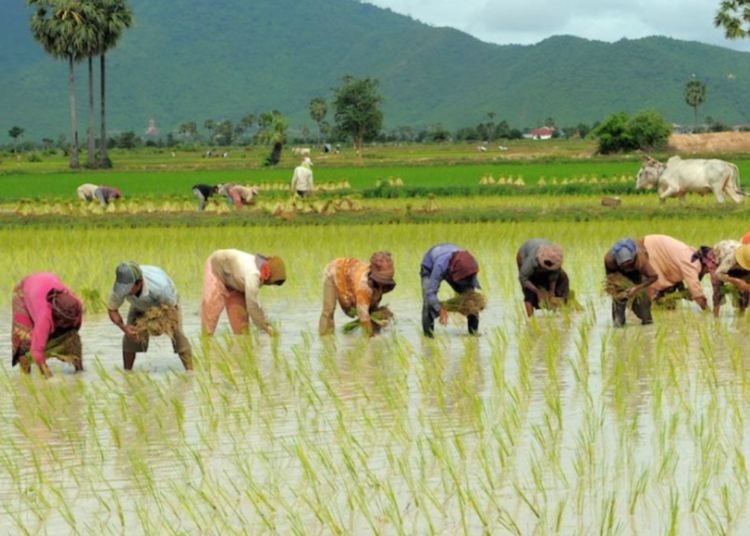The gains recorded in rice sufficiency in Nigeria are facing a possible reversal due to illegal rice importation, high operating cost and lack of institutional support for farmers in the country.
Investigation by LEADERSHIP has revealed that many of the rice farms and mills are struggling to maintain production levels reached in the recent past, leading to shut down of operations and loss of jobs in the rice value chain.
For example, the integrated and commercial rice mills in Kwara State are currently operating skeletal services. The production of local rice in the state has dropped drastically due to a combination of forces.
Consequently, scores of rice farmers and workers at the rice mills have lost their sources of income and sustenance.
LEADERSHIP gathered that the rice mills in Ilorin, the state capital, and Offa in the southern part of the state could not perform optimally because of the shortage in the production and supply of rice by the farmers.
The acting chairman of the Rice Farmers Association of Nigeria (RIFAN) in Kwara State, Mal Muhammed Salihu confirmed the drastic drop in the production of rice in the state.
He blamed the situation on the stoppage of the federal government’s Anchor-Borrower Scheme, lack of farm inputs such as fertilisers and tractors, and flooding.
He gave the recent statistics of rice production in the state as follows: 2020 (60,000 metric tonnes), 2021(59,000 metric tonnes), and 2022 (25,000 metric tonnes).
“We are supposed to produce rice three times annually, but we now produce rice only once in a year and that’s during the wet season.
“There is also the problem of flooding that washes away our rice during the wet season.
“There is also the problem of lack of farm inputs like fertilisers and tractors. Thousands of farmers are looking for fertilisers which they have not got. The anchor- borrower scheme has also stopped since 2021. All these factors are responsible for the low production of rice in the state,” RIFAN chairman stated.
Salihu appealed to the state government to help them with the supply of fertilisers and other inputs needed to improve rice production in the state.
LEADERSHIP gathered that a bag of local rice in Ilorin now goes for N41,000 as against the former price of N27,000.
Meanwhile, a member of the House of Representatives, Hon. Tunji Olawuyi has facilitated a training programme for rice farmers in Ekiti, Isin, Irepodun and Oke-Ero local government areas of Kwara State.
The beneficiaries of the programme, including women and youths were trained on how to operate water pumping machines to aid irrigation farming in the areas.
The two-day training programme was conducted by the National Productivity Centre (NPC) in collaboration with the federal lawmaker.
The trainer, Adebayo Lawal, from Small and Medium Enterprises Development Agency of Nigeria (SMEDAN), said empowering women and youths in rice farming through the mastery of water pumping machines was essential for a sustainable and prosperous agricultural future.
He said by utilising the machine, the beneficiaries will not only contribute to the environmental preservation but also drive economic growth and improve livelihoods.
The representative of Olawuyi, Mr Ganiyu Salami, said the lawmaker would continue to empower the people to ensure food security in the constituency.
The beneficiaries for the training were picked from Agbeloba farmers, Mekunu farmers, Arike farmers, Ominira farmers, Agbedun farmers and Agbeniyi farmers associations.
They were given certificates, pumping machines, and half bag of rice seedlings at the end of the exercise for start-up.
Most notable rice mills in Niger State have closed and been overtaken by many small-scale rice mills that are in every part of the state.
The Popular Badeggi Rice Mill sold to a private investor by the government has been abandoned after it was allegedly used to access loans.
It was discovered that the zeal for milling local rice by the small-scale milling companies has gone down this year compared to last year.
At Onis Milling Company, Badeggi Road, Bida, and Zaworo Milling Company that engage in large-scale milling, some of the staffers told LEADERSHIP some companies may be repackaging rice from the state, lowering the rating of the state.
Also in Minna, there are small-scale milling companies around Chanchaga, Suleja road, milling below capacity because patronage for local rice has dropped a little. Findings revealed that the milling companies have the capacity to employ between 10 and 50 people.
It is also discovered that wholesalers buy in bulk to break sales to retail outlets.
A rice dealer Hadiza Mohammed said, “We buy at N30,000 from the milling company and sell at N32,000, while at the open market it sells for N34,000.”
Meanwhile, Niger State governor, Umar Mohammed Bago, has subsidised the sales of fertiliser to N18,000 per bag from N26,000, to encourage farmers, saying other farm inputs will be subsidised while 300 new tractors will be purchased to help farmers.
Zabarmari, a community in Jere local government area of Borno State, is known as a hub of rice production, with rice farmers from Kebbi, Zamfara, Sokoto, among others, plying their trade there.
With the emergence of Boko Haram insurgency in the state, the Zabarmari Rice production faces some challenges resulting from attacks on farmers in their farmlands by the terrorists, who at times kill, or abduct the farmers for ramson.
About two years ago, the Zabarmari community was thrown into mourning after terrorists massacred over 60 farmers working at their farmlands.
The frequent attacks affected production and sales as customers for fear of their lives shunned visiting the Zabarmari community for purchase of rice.
Speaking to our correspondent on the business activities in the community, the legal adviser, Zabarmari Rice Farmers Association, Hassan Mohammed, said business has improved in the community, but expressed worry that the recent hike in prices of commodities has seriously affected their business.
He said about 300 rice milling machines are in use in the community where about 1,000 workers eke out a living through rice production in the area, with about 1300 to 1500 bags of rice produced daily in the community which are taken to Maiduguri, the capital city of Borno State, for sale.
He further said that before this time, a mudu of rice was sold for N1200 to N1300, but now cost between N2100 and N2,200.
He sought government’s intervention on the security of farms and farmers, adding that the potential in Zabarmari Rice farming, if well-harnessed, will provide the needed rice for Borno and other parts of the country by extension.
Notable rice processing mills in Adamawa state, Haske and Williams Rice, Gidan Gona Rice Mill, Shamad Concept Nigeria Ltd and Nadiya Rice Mill, are experiencing shortage of rice as raw materials due to looting of palliative stores and insurgency in the state.
Mr Mohammed Shamad, chief executive officer, Shamad Concept Nigeria Ltd, said he lost rice worth N188 million to the palliatives store looters in 2020, which forced the company to reduce its workforce from 300 to 50 due to scarcity of rice.
He added that rice needed for processing from the northern zone had drastically declined as the number of farmers had equally reduced in the area due to insurgency attacks.
On their part, officials at Haske and Williams Rice, Gidan Gona Rice Mill and Nadiya Rice Mill want the government to support the company financially.
In Bauchi State, Dema Farms, a factory set up to process rice in Jama’are local government area of the state, grapples to stay in business in the face of declining supply.
Generally, Jama’are is considered to be not only the hub of rice cultivation but also the food basket of the state. The factory was established with support through the initiative of former President Muhammadu Buhari’s government towards achieving self-sufficiency in rice production.
A source at the company who pleaded for anonymity said the firm had commercialised its services to interested rice farmers.
“We don’t have the capital to purchase the rice directly from the farmers to process and sell at our price. Instead, we open the space to every rice farmer to bring his produce for processing and pay the cost of processing.
“The firm was constructed with support from CBN under the anchor borrower scheme. The tools were given to the owner,” he said.
He said Dema Farms employs a few staff who assist in processing rice for farmers.
A rice farmer in Jama’are told LEADERSHIP that throughout the period the company has been operating, farmers only took their rice for processing.
He said while Dema Farms adds value to rice-chain production locally in the area, there is a need to take the operations of the company to the next level.
“If the company can buy the rice directly from farmers, it will be a great opportunity to not only produce the commodity locally but also employ youths,” he said.
Our correspondent reports that, recently, a private firm, Tiamin established an N18 billion rice mill factory at Yuli, a community in Bauchi local government which offered job openings to about 100 youths.
The firm has the capacity to produce about 600 tonnes of rice per day with a dedicated 10,000 hectares farm to sustain supply.
In Taraba State, rice millers told LEADERSHIP their activities had dropped to about 40 percent recently because of the current cost of rice in the state.
The millers at Gindin-Doruwa Rice Mill, who spoke to our correspondent, said a tin of rice that sold for N5,000 to N6,000, now sells for N9,500 to N10,000, a development which, he said, had caused the low sales.
The millers also blamed the cost of rice on the removal of fuel subsidy which they said had affected the cost of transportation and every other product in the market.
Thomas Tsokwa, the managing director of Gindin-Doruwa Rice Mill, said the company used to have 300 working staff on the site, but now only 250.
He said the challenge of the Rice Mill is lack of access roads, which hinders motorists from conveying their goods to the mill site.
The commissioner for Agriculture and Food Security, Hon. Oliver Namsseh said the government had procured tractors and fertilisers, including other farm inputs and seedings, to distribute to farmers across the three geopolitical zones of the state at a subsidised rate to assist farmers to go into massive farming activities and improve rice production.
He revealed that one of the most important things which the government considered best for the farmers was the provision of security to all the farmers in the state to guarantee safety for peaceful farming activities both during rainy and dry season farming.
In Benue State, the chairman of Rice Farmers Association, Fidelis Akosu has disclosed that no rice processing mills were established in the state in the name of the rice revolution programme of the federal government.
Akosu said many rice producing farmers in Benue State got farming inputs like fertilizer and agro-chemicals among others from the Anchor Borrower’s Programme of the federal government to enable them to produce more rice.
Akosu lamented a situation whereby some farmers who got these inputs could not pay back as agreed, a development that is making it difficult for others to get inputs this farming season.
“I am compiling new names to enable us to get the loan again, but for now this is the situation at hand,” Akosu added.
One of the farmers from Agasha cluster who identified himself as Iorwashima said, “I also applied for the Anchor Borrower’s loan and did everything and, in the end, nothing was given to us. I was shocked that after nothing was given to us, a few months back I got a message from the CBN asking me to return the loan I collected, and I replied that I only filled the form, but nothing was given to me, yet they are still sending those messages to me till date. ”
LEADERSHIP learnt that all the over 500 rice processing mills in Benue State are owned by private individuals. Of this number, over 200 are located in Gboko, while others are spread across the 23 local government areas.
Other prominent individuals who own rice processing mills in Benue State includes Mike Kaase Aondoakaa, who owns Miva Rice Processing Mills and the immediate past governor, Samuel Ortom, who owns Oracle Rice Processing Mills.
In an interview, some of the rice traders in Makurdi rice processing mills, who does not want their names in print, said due to the increase in the cost of rice following fuel subsidy removal, purchasing power, workforce and production had drastically reduced.
Before now, they said, a tin of rice was sold for N6000 and N7000 and now it is sold for N18,000 and above, and people who are even willing to buy cannot afford it even though rice is a staple food in every home.
Kebbi State is amongst the states in the federation that produce paddy rice following the massive production of local rice by rice farmers in the state.
In the days when there was insufficient technological instrument like milling machines, rice farmers after harvest fortified the product by using local cooking means.
During the first, second and third republics there were no milling machines. Between 1999 and 2010 rice milers began to operate in the state with Labana Rice Mills Limited situated along Sani Abacha by-pass in Birnin Kebbi metropolis, followed by Waccot Rice at Argungu, Bakaba Rice Mills in Argungu; Sajo Rice Mills in Takalau area in Birnin Kebbi metropolis, Lolo Rice Mills in Kamba, Rayhaan Rice Mills along Kalgo road and orthodox rice mills in Bagudo.
These millers started well, with sufficient staff and produced enough capacity and sold their products at an affordable price.
Now all these have changed due to the present hike of fuel price, raw materials and influx of prohibited foreign rice into the country through land borders.
General manager, Labana rice mills in Birnin Kebbi, Alhassan Yusuf said in Labana they produced 16 metric tonnes of rice per hour before, but that it rose from 20 to 36 and to 40 metric tonnes due to the improvement in the quality of machines and manpower.
The company has a total of 800 regular and non-regular workers.
According to him, a 50kg bag sells at N36,000 as against N12,000 in the previous time.
Other owners of rice companies told our correspondent that there was a difference between previous production and now, which they attributed to the high cost of raw materials and fuel, and influx of foreign commodities into the country.
They called on the government to immediately curtail the smuggling of foreign rice in the country.
According to the statistics revealed by the other millers, Lolo rice mills in Kamba has 300 staff members, produces about five to 10 metric tonnes per day and sells at N35,000 per 50kg bag.
Another rice mill, Bakaba, has 500 staffers, produces 100 metric tonnes per week and sells at N34,000 a bag. Also, Sajo has over 400 employees, produces 20 to 50 metric tonnes in a day and sells at N33,000 per 50kg.
Equally, Waccot has about 600 workers and produces 13 and 14 metric tonnes in two hours, and sells a 50kg bag at N35,000.
Jigawa State is one of the major rice producing states in Nigeria where the business is booming. The state’s annual production rate, both dry season and rainy season farming, stands at over 546,400 metric tonnes.
Rice production started increasing in Jigawa state from 2011 as a result of a series of federal and state government policies and interventions, the development became more popular in 2015 with the introduction of Cluster Farming, border closure, presidential fertiliser initiative, and soft loans among others.
The policy introduced by the immediate past state government, which was also maintained by the current administration, known as “Farming as Business” encouraged many young men to venture into farming, as many modern techniques of farming, improving seeds and modern farm inputs were made available and accessible.
The provision of such facilities contributed to the increase of rice yield from an average of 2.4 tonnes to 6.76 tonnes per hectare with some clusters reaching as high as 8.2 metric tonnes.
In the 2015/2016 season, the state’s annual rice production was 92,300 tonnes for the dry season and rainy season. In 2017 it rose to 352, 900 metric tonnes, and by the year 2020, the production reached 546,400 MT.
The dramatic increase of the rice production in the state is also related to embracing dry season rice farming as well as clearing and developing new fields for the business.
Thousands of youths embraced farming as business in the state as many up-takers were ready to buy the Paddy rice from the farmers.
The booming of rice production in Jigawa state has led to the springing up of major, medium and mini rice mills in the state, which equally provide more job opportunities within the value chain.
According to statistics from the state ministry of commerce, there are over 3,000 mini milling machines functioning in the state and over 400 medium milling machines.
Some of the major rice mills in the state include: Three Brothers, Jigawa Rice, with milling capacity of 120,000 tonnes per
Annum; Majestic Rice with milling capacity of 60,000 MT per annum. All the three are currently on production and uptake paddy rice in the state.
Dangote Rice Mills with a capacity of milling 280,000 MT per annum is currently under construction in Kaugama local government of the state, with work at over 80 percent to completion.
According to the state chairman of Rice Farmers Association of Nigeria (RIFAN), Alhaji Adamu Maigora Haruna, Jigawa has the potential to feed Northern Nigeria with rice if the production continues to receive the required support and intervention.
Adamu revealed that flood is one of the major challenges they are facing, along with the high cost of fertiliser and labour.
He called on the state and federal government to reintroduce subsidies for farm inputs, including improved seeds and fertiliser, and make them available, affordable and timely accessible to sustain the momentum gained towards achieving food security.
Alhaji Ado warned that any policy somersault on rice production can draw the nation back to square zero, which is heavy dependence on food importation.





